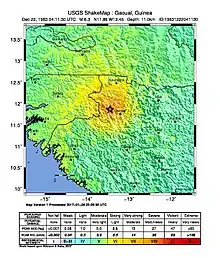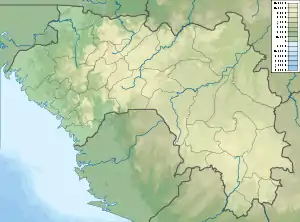1983 Guinea earthquake
On December 22, 1983 an earthquake with a magnitude of 6.3 struck northern Guinea, killing around 300 people, and injuring 1,500. Around 200 people went missing. An earthquake of this magnitude was unusual for this region of West Africa, which was previously believed by most seismologists to be aseismic.[1] The earthquake destroyed 5,000 houses. It had an intensity of IX (Violent) on the Mercalli intensity scale,[1] although USGS reported it as VIII (Severe)[2] The earthquake caused cracks in the ground, and an entire cavern to collapse.[1]

 | |
| UTC time | 1983-12-22 04:11:29 |
|---|---|
| ISC event | 563420 |
| USGS-ANSS | ComCat |
| Local date | December 22, 1983 |
| Local time | 04:11 |
| Magnitude | 6.3 Mw |
| Depth | 11.3 km (7 mi) |
| Epicenter | 11.866°N 13.529°W |
| Type | Oblique – Normal |
| Casualties | 300 dead, 1,500 injured, 200 missing |
Geology
The earthquake occurred on the edge of the Paleozoic Bové Basin, near the western margin of the Precambrian West African Craton and close to the southern end of the late Proterozoic to Hercynian Mauritanide Belt.[3]
References
- Langer, C. J.; Bollinger, G. A. (1992). Natural Hazards in West and Central Africa. International Monograph Series. Vieweg+Teubner Verlag, Wiesbaden. pp. 31–36. doi:10.1007/978-3-663-05239-5_4. ISBN 9783663052418.
- "M 6.3 - Guinea". earthquake.usgs.gov. Retrieved 2018-01-12.
- Dorbath, C.; Dorbath, L.; Gaulon, R.; George, T.; Mourgue, P.; Ramdani, M.; Robineau, B.; Tadili, B. (1984). "Seismotectonics of the Guinean Earthquake of December 22, 1983". Geophysical Research Letters. 11 (10): 971–974. Bibcode:1984GeoRL..11..971D. doi:10.1029/GL011i010p00971.